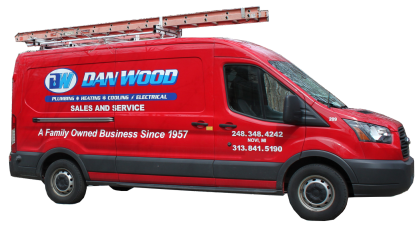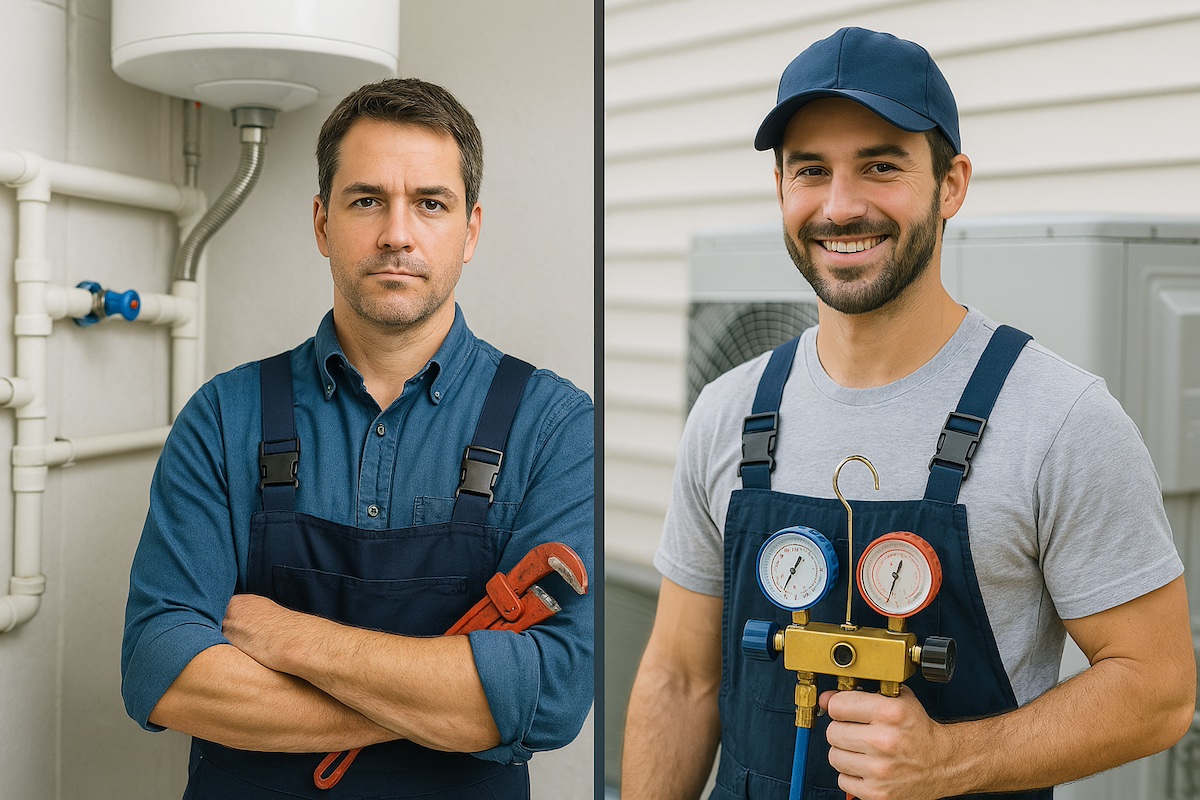When something goes wrong in your home’s plumbing or heating and cooling system, it can be tricky to know whom to call. Do you need a plumber or an HVAC technician? While both professionals specialize in home maintenance and repairs, their expertise differs significantly. Understanding these differences will help you make the right choice and ensure the job gets done efficiently.
In this guide, we’ll break down the roles of plumbers and HVAC technicians, compare their skills, and outline when you should call each one. Let’s dive in!
Understanding the Roles of a Plumber and an HVAC Technician
What Does a Plumber Do?
A plumber specializes in the installation, repair, and maintenance of water-related systems. Their primary responsibilities include:
- Fixing leaky pipes, faucets, and toilets.
- Unclogging drains and sewer lines.
- Installing and maintaining water heaters.
- Repairing or replacing broken pipes.
- Handling gas line installations and repairs.
- Ensuring proper water pressure throughout the home.
Plumbers are essential for maintaining a functional water supply and drainage system in homes and commercial buildings. They work with materials like copper, PVC, and steel pipes to ensure that clean water reaches your home while wastewater is safely removed.
What Does an HVAC Technician Do?
An HVAC (Heating, Ventilation, and Air Conditioning) technician focuses on climate control systems. Their key responsibilities include:
- Installing, repairing, and maintaining heating and cooling systems.
- Diagnosing furnace and air conditioning unit problems.
- Maintaining ventilation and ductwork.
- Handling thermostat installations and programming.
- Ensuring optimal indoor air quality and humidity control.
- Working with refrigerants and complex electrical components.
HVAC technicians ensure that homes and buildings remain comfortable year-round by keeping heating and cooling systems running efficiently.
Key Differences Between a Plumber and an HVAC Technician
1. Areas of Expertise
- Plumbers deal with water supply, drainage, and plumbing fixtures.
- HVAC technicians handle heating, cooling, ventilation, and air quality systems.
2. Required Training and Certifications
Both plumbers and HVAC technicians require specialized training and certifications.
- Plumbers must complete an apprenticeship program and often need a state license.
- HVAC technicians must complete technical training programs and earn certifications like EPA 608 for handling refrigerants.
3. Tools and Equipment Used
- Plumbers use wrenches, pipe cutters, plungers, and drain snakes.
- HVAC technicians use multimeters, refrigerant gauges, and ductwork tools.
4. Common Jobs and Scenarios
| Issue | Plumber | HVAC Technician |
|---|---|---|
| Clogged drains or toilets | ✅ | ❌ |
| Leaky pipes or burst pipes | ✅ | ❌ |
| Water heater installation/repair | ✅ | ❌ |
| Air conditioning unit repair | ❌ | ✅ |
| Furnace not working | ❌ | ✅ |
| Poor indoor air quality | ❌ | ✅ |
| Thermostat issues | ❌ | ✅ |
When to Call a Plumber vs. an HVAC Technician
Signs You Need a Plumber
- Low water pressure in faucets or showers.
- Water leaks, flooding, or visible pipe damage.
- Persistent drain clogs or slow drainage.
- No hot water or issues with the water heater.
- Sewer backups or foul odors from drains.
Signs You Need an HVAC Technician
- AC or heating system is not functioning properly.
- Uneven heating or cooling in different rooms.
- Strange noises from the HVAC system.
- High energy bills due to HVAC inefficiency.
- Poor air quality, excessive humidity, or mold growth.
Can Plumbers and HVAC Technicians Work Together?
Yes. While their specialties differ, plumbers and HVAC technicians often collaborate on projects. For example:
- Water Heater Installations – Plumbers connect the water lines while HVAC technicians handle gas and electrical connections.
- New Home Construction – Plumbers install pipes while HVAC technicians set up heating and cooling systems.
- Bathroom or Kitchen Remodels – Both professionals may be needed to reroute plumbing and ensure proper ventilation.
Related Reading – Plumber vs Handyman – Key Differences Explained
Frequently Asked Questions (FAQs)
What is the main difference between a plumber and an HVAC technician?
Plumbers specialize in water supply and drainage systems, while HVAC technicians focus on heating, cooling, and ventilation.
Can an HVAC technician fix a water heater?
Some HVAC technicians handle water heater issues, but plumbers are generally the best professionals for installation and repair.
Do plumbers or HVAC technicians earn more?
Earnings depend on experience, certifications, and location. Both trades offer competitive salaries with opportunities for growth.
Which career is harder: plumbing or HVAC?
Both careers require physical labor and technical skills. HVAC work involves electrical components and refrigerants, while plumbing requires working with water systems and potential emergencies like leaks and pipe bursts.
Can I call a plumber for gas line issues?
Yes, many plumbers are trained to handle gas line repairs and installations, but some HVAC technicians also work with gas-related heating systems.
Conclusion: Get Reliable Plumbing and HVAC Services with Dan Wood Services
At Dan Wood Services, we understand the importance of having a well-functioning home. Whether you’re dealing with a plumbing emergency or need a professional HVAC tune-up, our team is ready to help. With years of experience in both plumbing and HVAC services, we take pride in providing reliable, high-quality solutions for homeowners and businesses alike.
Need a plumber to fix a leak or a technician to get your furnace running smoothly? We’ve got you covered. Contact Dan Wood Services today for fast, professional service. Visit us at Dan Wood Services to schedule an appointment or learn more about our services.
By choosing the right professional for the job, you can ensure your home stays comfortable and problem-free all year round.




